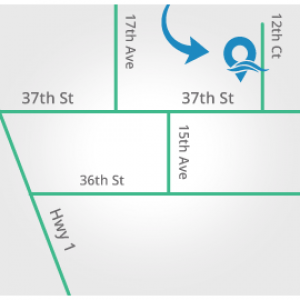Knee pain is one of the most frustrating complaints among people of all ages, and arthritis of the knee joint is unfortunately common. The strongest and largest joint in the body, the knee is comprised of a complex network of muscles, bones, ligaments, tendons and tissue, any of which can become damaged or worn over time. While there are many different causes of chronic knee pain, one that we deal with the most is arthritis.
Arthritis is described as inflammation of one or more of your joints, resulting in pain, swelling, and stiffness. There are more than 100 different types of arthritis, but osteoarthritis is the most common form in the knee. Osteoarthritis occurs over time with regular wear and tear and is considered a degenerative condition, which is why it often affects older people.
While it is true that any joint in the body can be affected by arthritis, the knee is particularly susceptible. Not only is arthritis of the knee annoying, but it can have an impact on your ability to perform regular, day-to-day activities comfortably. This is where knee replacement surgery comes in. In fact, the most common reason people undergo a total knee replacement is because of arthritis.
What is a Total Knee Replacement?
If you are suffering from osteoarthritis, knee replacement surgery may be your best option for making a full recovery and alleviating pain. Individuals who are in need of a total knee replacement usually have a hard time walking, going up and down stairs, hiking, and switching between sitting and standing. In some cases, you may even experience knee pain when resting.
Also referred to as knee arthroplasty, a total knee replacement for arthritis is recommended for those who are losing cartilage in the knee, decreasing the protective space between the knee bones and leading to painful bone-on-bone contact. If you have been diagnosed with arthritis and are experiencing the following, you may be a good candidate for knee replacement surgery:
- Knee pain that affects your day-to-day activities
- Severe knee pain while resting
- Chronic knee pain, inflammation, and swelling that is constant
- Knee deformity
- No sign of improvement with anti-inflammatory medications or other treatments
What to Expect from a Total Knee Replacement?
Perhaps more accurately called knee “resurfacing” because the entire bones aren’t actually replaced, this type of surgery is incredibly common. During knee replacement surgery, the damaged cartilage at the ends of the femur and tibia are removed and replaced with metal implants that will recreate the surface of the knee joint. The patella (kneecap) is also resurfaced, although the degree to which this happens will depend on the patient. The surgeon then inserts a plastic spacer between the metal implants, creating a smooth joint that allows all components to work together, free of pain.
An estimated 90% of all knee replacement surgery patients see a huge improvement and experience far less pain and discomfort.
Risks and Complications of a Total Knee Replacement
As with any type of procedure, there are numerous risks and complications associated with a total knee replacement. Some of these risks include:
- Infection
- Blood clots in the lungs or legs
- Heart attack
- Stroke
- Nerve damage
- Wear and tear of the knee implant device
- Complications of the lungs, heart, gastrointestinal system, or neurological system
Total Knee Replacement Alternatives
The type of treatment you will need will depend on the severity of arthritis, your age, and your symptoms. The initial line of treatment for arthritis of the knee begins with modifying exercise and activity in conjunction with physical therapy. This form of treatment can be quite effective in decreasing pain, but unfortunately arthritis usually advances and requires surgery. Physical therapy is beneficial because it works to strengthen the muscles around the knee, taking away some of the weight and pressure on the joint.
Knee replacement surgery is a safe, minimally-invasive procedure that may help you get back on your feet. If you are suffering from arthritis, it may be time to consider this route of treatment.



